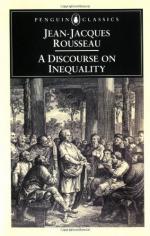
|
Chapter 1, A Discourse on the Moral Effects of the Arts and Sciences, Part I
• Chapter 1, A Discourse on the Moral Effects of the Arts and Sciences, Part I
• Jean-Jacques Rousseau wonders about the moral effects of the arts and sciences on a society in his "A Discourse on Inequality".
• He finds the end of Europe's "barbarism" results in a new period of reason.
• Rousseau believes arts and sciences exist under government and the law.
• He sees that this existence causes people to become despotic.
• Rousseau thinks slavery makes men civilized.
• Before art, men had natural morality according to Rousseau.
• He thinks humans could see through people because of life's simplicity.
• Rousseau feels today men hide and suppress motives, such as jealousy.
• He sees that the arts have helped to repress wickedness.
• Rousseau believes that art has caused the degradation of society.
• Socrates praised ignorance because of its effects...
|
This section contains 1,669 words (approx. 6 pages at 300 words per page) |

|




